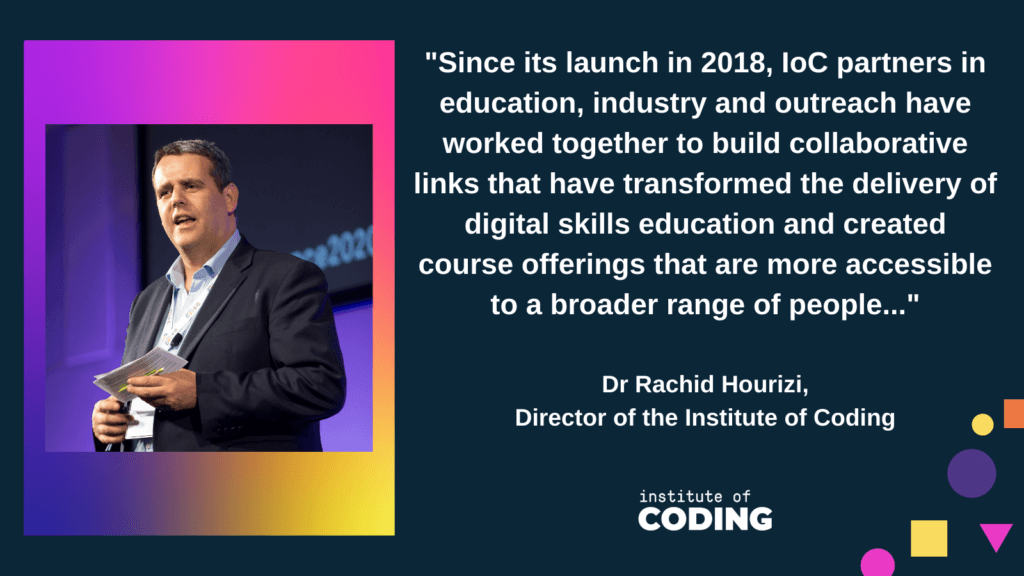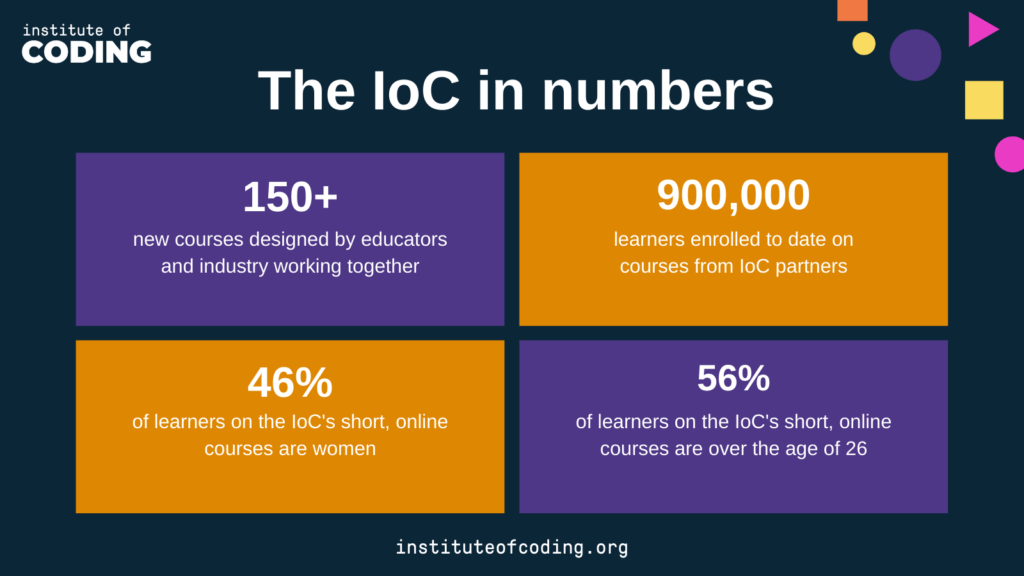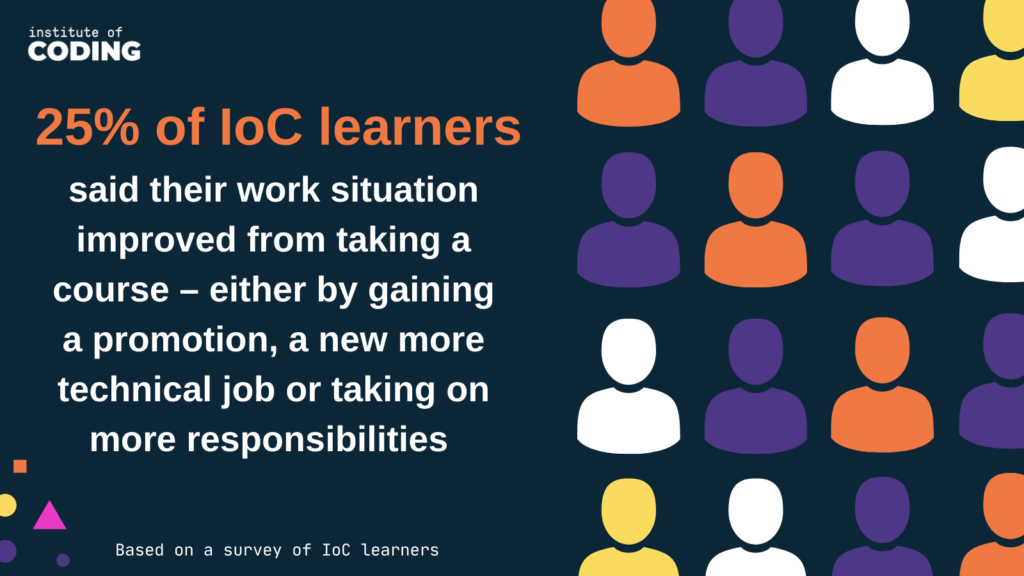How the Institute of Coding is responding to the UK’s Digital Skills Gap

The Institute of Coding (IoC) is a national consortium of employers, educators, and outreach organisations that has proven results delivering advanced digital skills education and upskilling people to improve their employability.
To date, the IoC has enrolled 900,000 learners on 150+ accessible and flexible courses that have been created in collaboration with industry groups and leading employers. Through this innovative cross-sector and cross-region collaboration, the IoC is producing a larger, more diverse, and better-skilled pipeline of talent. This is helping to address the UK’s digital skills gap and is supporting the pandemic recovery by helping people back into employment.
The Challenge: An Emerging Digital Skills Gap
In 2017/2018, the UK’s digital skills gap was emerging and was adversely affecting the tech sector, as well as the larger economy including employers in non-tech areas. As a result of this skills gap, several core challenges were agreed by government, the higher education sector, and industry, and this formed the basis for the creation of the IoC.
The core challenges that were identified include:
- A high demand for a skilled talent pipeline – The UK does not produce enough highly skilled I.T. and digital specialists to fill domestic demand and there is increasing international competition for these workers. In 2016 it was estimated that 500,000+ highly-trained digital specialists would be needed by 2022 and more recent estimates suggest there will be a need for up to 1.5 million additional people with advanced skills in the next two years.
- The need for upskilling across the UK’s workforce – A 2017 House of Commons report found that 12.6 million of the adult UK population lacked basic digital skills and this has had a profound impact on large and small employers’ ability to recruit and train their staff.[1] This issue has only increased since that point.
- Issues with skills alignment – Industry input was lacking in digital skills education and this impacted the productivity and innovation of the tech sector and the employability of learners emerging from tech-focused higher education programmes (i.e. Computer Science).
- Lack of diversity – In the digital sector, both the learner cohorts and the workforce are not sufficiently diverse or inclusive. In 2016, only 16 per cent of computer science graduates were women and women made up 23% of the people working in STEM roles across the UK.[2]
The Response: The Creation of the IoC

The scale, pace, and breadth of the digital skills gap meant that a large-scale, collaborative, cross-sector response was required. No single stakeholder had a comprehensive view of the rapidly evolving problem, available solutions, evidence, and information from different parts of the UK and different sectors. But, if brought together, real change was possible.
This led to the creation of the IoC, a £40-million initiative supported by the UK government (via the Office for Students) that was announced by the former Prime Minister in January 2018. Collaborative by design, the IoC is a large national consortium that brings together UK education providers (in England and Wales), outreach groups, a range of employers, and industry bodies to co-develop new courses, events, and programmes that are helping a larger and more diverse group of learners into digital careers through higher education.
At launch, the IoC included 25 universities and 60 companies (large corporates and SMEs), outreach organisations, and professional bodies (the British Computer Society and CREST). Over the last three years, the IoC has grown to include 35 universities and more than 200 employers (e.g. Amazon, Google, Microsoft, IBM, JP Morgan, Accenture, Deloitte, Shell, and BP) and outreach groups that are working together to create and deliver digital skills education.

As part of the IoC project scope, these groups have co-developed industry-led standards and innovative programmes designed to improve the industry readiness and employability of many groups, including university students (within computer science departments and beyond), digital workers (in both traditional IT roles and roles that are rapidly becoming digital), and people that are underrepresented (widening participation).
Beyond its consortium, the IoC has sparked cross-sector collaboration to create new models for digital skills education and upskilling. This includes working with non-IT sectors like finance (banks), energy (oil companies), aviation, heritage (the British Library), and others to create bespoke digital skills training for their existing workforces and to ensure the talent pipeline being generated through higher education will support their continued work.
Throughout the IoC project, this group has taken a fresh and disruptive approach to digital learning that incorporates industry input at all points and keeps the focus on diversity and inclusion. This collaborative approach allows the IoC to anticipate future challenges (including those that have already surfaced in other sectors/geographies) and use shared best practice to deliver solutions as broadly as possible.
Key Results

In its first three years of operation, the IoC has had a significant and demonstrable impact. Through the collaborative approach described above, it has increased teaching capacity for digital skills within the UK’s higher education (HE) sector and helped to refocus HEIs to the needs of industry and the tech sector. At the same time, it has improved learner access to education and work experience, expanded the talent pipeline, ensured employer input to new courses, and improved learners’ employability.
In addition to this overarching impact, it has:
- enrolled approximately 900,000 learners (UK and overseas) onto IoC courses, including 700,000 on the innovative IoC short courses launched in December 2019 by the University of Leeds, in collaboration with FutureLearn and other industry partners
- designed more than 150 digital skills courses (in all delivery forms), including more than 50 short courses (many of which are online) that have proven more accessible for those already in work to upskill and for employers to share with their workforce
- diversified access to digital skills:
- women make up 46% of the learners on online programmes, vs 16% of English computer science graduates
- the IoC is also reaching beyond the traditional university age cohort and those in different stages of employment, with 56% of online learners over the age of 26, 39% employed, and 19% currently unemployed or seeking work
- through our award-winning CTRL Your Future diversity campaign, new flexible courses are being promoted to a diverse range of audiences to encourage broad participation
- ensured employer input to new courses by forming new partnerships between employers and educators to provide industry input into course development, this includes engaging with SMEs to create courses to support staff development
- developed novel ways to gain work experience through student companies and industry/HE project collaborations
The IoC has also improved employability for people against a background of pandemic-driven job losses. In a recent survey of IoC learners:
- 58% of respondents had a career-related motivation for taking an IoC course
- 25% of all respondents had either been promoted, gained a new more technical/digital job, or taken on additional responsibilities in their existing role since engaging with an IoC course (within three months of taking the course)
- respondents reported themselves to be better prepared for future careers (63%), more confident working in tech (61%), and more confident to apply for tech roles (54%)
If this data is extrapolated to our 900,000 learners, that means that approximately a quarter (225,000) are expected to have had a rapid, positive employment outcome as a result of taking one or more IoC courses.

Conclusion and Next Steps

The IoC has had significant impact through its work to date. This includes responding to the initial core challenges by:
- increasing the volume and diversity of learners in the digital skills pipeline
- expanding digital skills education in the UK
- making courses more accessible and promoting inclusion in higher education and the digital economy
- bringing together outstanding collaborators from industry, government, higher education, and outreach organisations
As we look forward, the scale and productivity impact of the UK’s digital skills shortage and the rising number of vacancies (100,000 tech sector vacancies per month are expected by June 2021 along with other tech roles needed throughout the economy)[3] means that continued action to address the digital skills gap is essential, especially in light of the unemployment that is resulting from the pandemic. Demand for talent within the digital technology sector has grown by 150% over the past 4 years,[4] and this growth will continue as we move into a ‘new normal’ where the tech sector is expected to power our economic recovery.[5]
We need to continue to create opportunities for people already in careers to upskill as well as for people to gain the advanced digital skills needed for a career in tech. Digital skills are becoming a near-universal requirement for employment and are required in at least 82% of online advertised job openings[6] and both government and the private sector are highlighting the requirement to supply leaders, managers, and workers with a higher level of general digital training, alongside the need to supply people with advanced specialisations in areas like AI and data science.
In terms of next steps, the IoC is seeking funding to continue delivering advanced (university level) digital skills courses that will directly respond to the urgent need for post-furlough upskilling and reskilling. This digital skills provision will attract a larger and more diverse pipeline of talent which will include underrepresented groups and those whose employment has been impacted by the pandemic.

[1] House of Commons Science and Technology Committee, Digital Skills Crisis (2017): https://publications.parliament.uk/pa/cm201617/cmselect/cmsctech/270/270.pdf
[2] WISE undergraduate degree stats (2016): https://www.wisecampaign.org.uk/statistics/higher-education-statistics-2016/
[3] Tech Nation (2020): https://technation.io/news/2020-uk-tech-sector-data/
[4] See above.
[5] McKinsey (2020): https://www.mckinsey.com/~/media/McKinsey/Business%20Functions/McKinsey%20Digital/Our%20Insights/How%20six%20companies%20are%20using%20technology%20and%20data%20to%20transform%20themselves/The-next-normal-the-recovery-will-be-digital.pdf
[6] DCMS (2019): https://assets.publishing.service.gov.uk/government/uploads/system/uploads/attachment_data/file/807830/No_Longer_Optional_Employer_Demand_for_Digital_Skills.pdf







